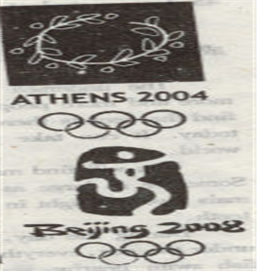
In 1896, the first modern Olympic Games
1 (hold) in Athens, Greece. Since then many
countries
2 (hold) the Olympics successfully, such as

England, France, Germany, Canada, the USA,
Spain and Australia. After more than 100 years the Games
3 (return) to its hometown in 2004.
When people hold the Olympic Games, they always
4 (make) an emblem (会徽). The
emblem of the Athens Olym

pic Games in 2004 was a white circle of olive branches in the sky. People
said, “While in Athens, the world should be at peace. We hope the peace is not just for a short time.
We would like the message from the Athens Games
5 (help) countries come together.”
Next year the Olympic Games
6 (hold) in China. And China has already made a seal (印章)as
the emblem of the Beijing 2008 Olympic Games. The emblem
7 (have) a single Chinese character on
a red seal and means “Chinese seal-dancing Beijing”. Below it, there
8 (be) the words “Beijing
2008”. The character in the emblem is “Jing”. It
9 (mean) “capital” of China and it is also
like a runner or a dancer. The running figure of the emblem
10 (show) the spirit (精神) of the
Olympics-faster, higher and stronger.


 England, France, Germany, Canada, the USA,
England, France, Germany, Canada, the USA,  pic Games in 2004 was a white circle of olive branches in the sky. People
pic Games in 2004 was a white circle of olive branches in the sky. People